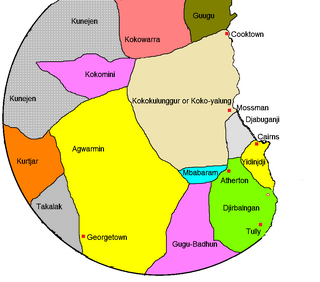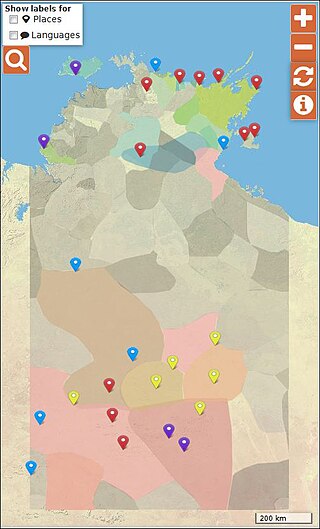Related Research Articles

The Indigenous languages of Australia number in the hundreds, the precise number being quite uncertain, although there is a range of estimates from a minimum of around 250 up to possibly 363. The Indigenous languages of Australia comprise numerous language families and isolates, perhaps as many as 13, spoken by the Indigenous peoples of mainland Australia and a few nearby islands. The relationships between the language families are not clear at present although there are proposals to link some into larger groupings. Despite this uncertainty, the Indigenous Australian languages are collectively covered by the technical term "Australian languages", or the "Australian family".

Batchelor Institute of Indigenous Tertiary Education provides training and further education, and higher education for Aboriginal Australians and Torres Strait Islanders. It is based in Kungarakany and Awarai country, in Batchelor, Northern Territory in Australia.

Larissa Yasmin Behrendt is an Australian legal academic, writer, filmmaker and Indigenous rights advocate. As of 2022 she is a professor of law and director of research and academic programs at the Jumbunna Institute for Indigenous Education and Research at the University of Technology Sydney, and holds the inaugural Chair in Indigenous Research at UTS.
Ngarrindjeri, also written Narrinyeri, Ngarinyeri and other variants, is the language of the Ngarrindjeri and related peoples of southern South Australia. Five dialects have been distinguished by a 2002 study: Warki, Tanganekald, Ramindjeri, Portaulun and Yaraldi.

Rosalie Lynette Kunoth-Monks, also known as Ngarla Kunoth, was an Australian film actress, Aboriginal activist and politician.
Raymattja Marika, also known as Gunutjpitt Gunuwanga, was a Yolngu leader, scholar, educator, translator, linguist and cultural advocate for Aboriginal Australians. She was a Director of Reconciliation Australia and a member of the Australian Institute of Aboriginal and Torres Strait Islander Studies. She was also a director of the Yothu Yindi Foundation and a participant in the 2020 Summit, which was held in April 2008. Marika advocated understanding and reconciliation between Indigenous Australian and Western cultures.

Henrietta Marrie is a Gimuy Walubara Yidinji elder, an Australian Research Council Fellow and Honorary Professor with the University of Queensland.
Bidjara, also spelt Bidyara or Pitjara, is an Australian Aboriginal language. In 1980, it was spoken by 20 elders in Queensland between the towns of Tambo and Augathella, or the Warrego and Langlo Rivers. There are many dialects of the language, including Gayiri and Gunggari. Some of them are being revitalised and are being taught in local schools in the region. The various dialects are not all confirmed or agreed by linguists.
Dhauwurd Wurrung is a term used for a group of languages spoken by various groups of the Gunditjmara people of the Western District of Victoria, Australia. Keerray Woorroong is regarded by some as a separate language, by others as a dialect. The dialect continuum consisted of various lects such as Kuurn Kopan Noot, Big Wurrung, Gai Wurrung, and others. There was no traditional name for the entire dialect continuum and it has been classified and labelled differently by different linguists and researchers. The group of languages is also referred to as Gunditjmara language and the Warrnambool language.
Gubbi Gubbi, also spelt Kabi Kabi, is a language of Queensland in Australia, formerly spoken by the Gubbi Gubbi people of South-east Queensland. The main dialect, Gubbi Gubbi, is extinct, but there are still 24 people with knowledge of the Butchulla dialect, a language spoken by the Butchulla people of K'gari.

Wamin, also known as Agwamin or Ewamian, is an Australian Aboriginal language of North Queensland spoken by the Ewamian people. Wamin was traditionally spoken in the Etheridge region, in the areas around Einasliegh, Georgetown, and Mount Surprise.

Margaret Florey is an Australian linguist whose work focuses on the revitalization and maintenance of Indigenous Australian languages. She has documented changes in contemporary speech, such as the expression Yeah, no which is becoming more prevalent in Australia.
Living Languages is an international non-profit organisation which was established to advance the sustainability of the world's Indigenous languages.

The Living Archive of Aboriginal Languages (LAAL) is a digital archive of literature in endangered languages of Australia, containing works in over forty Australian Aboriginal languages from the Northern Territory, Australia. The project to build the archive was initially funded in 2012 by the Australian Research Council, and was developed in collaboration with the Charles Darwin University as the lead institution, the Northern Territory Government and the Australian National University. Later partners include the Batchelor Institute of Indigenous Tertiary Education, the Northern Territory Library and the Northern Territory Catholic Education Office.
Gavan Breen, also known as J. G. Breen, was an Australian linguist, specialising in the description of Australian Aboriginal languages. He studied and recorded 49 such languages.
Kathleen Mary Mills, also known as Mooradoop and Aunty Kathy, was an Australian community leader, singer, Aboriginal elder and activist in the Northern Territory of Australia. She had a large family, all musical, with several of her daughters being well known as the Mills Sisters.
Felicity Meakins is a linguist specialising in Australian Indigenous languages, morphology and language contact, who was one of the first academics to describe Gurindji Kriol. As of 2022, she is a professor at the University of Queensland and Deputy Director of the University of Queensland node of the Australian Research Council (ARC) Centre of Excellence for the Dynamics of Language. She holds an ARC Future Fellowship focusing on language evolution and contact processes across northern Australia.
Yvette Henry Holt is an Aboriginal Australian poet, essayist, academic, researcher and editor, she heralds from the Bidjara, Yiman and Wakaman nations of Queensland. The youngest child born to prominent Aboriginal Elder, Albert Holt and Marlene Holt. Holt came to prominence with her first multi-award-winning collection of poetry, Anonymous Premonition, published by the University of Queensland Press in 2008. Since 2009 Holt has lived and worked in Central Australia among the Central and Western Arrernte peoples of Hermansburg and Alice Springs.
Helen Groger-Wurm, birth name Helene Gröger (1921–2005), was an Austrian-Australian ethnologist, anthropologist and linguist. After earning a Ph.D. from the University of Vienna in 1946, she married the Hungarian-born linguist Stefan Wurm. In 1954 the couple moved to Australia where they obtained Australian citizenship. They carried out field research in New Guinea and in northern Australia. From 1962 until her 1974, Groger-Wurm was a research officer at the Australian Institute of Aboriginal Studies, lecturing in parallel on the Aboriginal way of life at the Australian National University. She went on to take up work a librarian at the Australian National Library until her retirement in 1982. She is remembered in particular for her work in connection with Aboriginal bark painting.
References
- ↑ "RNLD - Jeanie Bell". RNLD. 2015. Retrieved 1 June 2015.
- ↑ "Jeanie Bell". Batchelor Institute of Indigenous Tertiary Education. 2014. Archived from the original on 12 March 2016. Retrieved 1 June 2015.
- ↑ "National Library of Australia - Australian Women's Register". National Library of Australia. 2015. Retrieved 1 June 2015.
- ↑ Bell, Jeanie (2007). "Why we do what we do! Reflections of an Aboriginal linguist working on the maintenance and revival of ancestral languages". Ngoonjook. 30: 12–18.
- ↑ "National Library of Australia - Australian Women's Register". National Library of Australia. 2015. Retrieved 1 June 2015.
- ↑ Bell, Jeanie (2007). "Why we do what we do! Reflections of an Aboriginal linguist working on the maintenance and revival of ancestral languages". Ngoonjook. 30: 12–18.
- ↑ "National Library of Australia - Australian Women's Register". National Library of Australia. 2015. Retrieved 1 June 2015.
- ↑ "National Library of Australia - Australian Women's Register". National Library of Australia. 2015. Retrieved 1 June 2015.
- ↑ Bell, Jeanie (2007). "Why we do what we do! Reflections of an Aboriginal linguist working on the maintenance and revival of ancestral languages". Ngoonjook. 30: 12–18.
- ↑ Bell, Jeanie (2007). "Why we do what we do! Reflections of an Aboriginal linguist working on the maintenance and revival of ancestral languages". Ngoonjook. 30: 12–18.
- ↑ "RNLD - Jeanie Bell". RNLD. 2015. Retrieved 1 June 2015.
- ↑ "Jeanie Bell". Batchelor Institute of Indigenous Tertiary Education. 2014. Archived from the original on 12 March 2016. Retrieved 1 June 2015.
- ↑ "Jeanie Bell honoured at NAIDOC reception". Batchelor Institute of Indigenous Tertiary Education. 2012. Retrieved 1 June 2015.